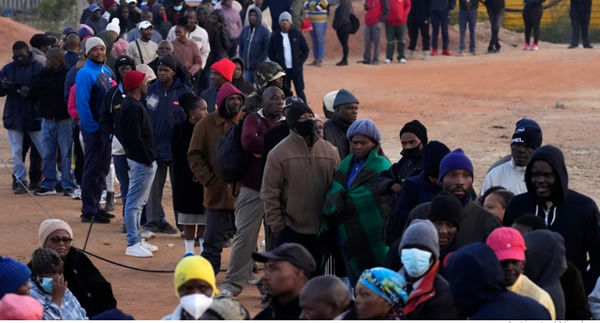
South Africans began voting Wednesday in an election seen as their country’s most important in 30 years, and one that could put their young democracy in unknown territory.
At stake is the three-decade dominance of the African National Congress party, which led South Africa out of apartheid’s brutal white minority rule in 1994. It is now the target of a new generation of discontent in a country of 62 million people — half of whom are estimated to be living in poverty.
Africa’s most advanced economy has some of the world’s deepest socio-economic problems, including one of the worst unemployment rates at 32%.
The lingering inequality, with poverty and joblessness disproportionately affecting the Black majority, threatens to unseat the party that promised to end it by bringing down apartheid under the slogan of a better life for all.
After winning six successive national elections, several polls have the ANC’s support at less than 50% ahead of this one, an unprecedented drop. It might lose its majority in Parliament for the first time, although it’s widely expected to hold the most seats.
Support has been fading. The ANC won 57.5% of the vote in the last national election in 2019, its worst result to date.
South African President Cyril Ramaphosa, the leader of the ANC, has promised to “do better.” The ANC has asked for more time and patience.
Any change in the ANC’s hold on power could be monumental for South Africa. If it does lose its majority, the ANC will likely face the prospect of having to form a coalition with others to stay in government and keep Ramaphosa as president. An ANC having to co-govern has never happened before.
The election will be held on one day across South Africa’s nine provinces, with nearly 28 million people registered to vote at more than 23,000 polling stations. Final results are expected by Sunday. Ramaphosa was due to cast his vote in the morning in the Johannesburg township of Soweto where he was born and which was once the epicenter of the resistance to apartheid.
The opposition to the ANC in this election is fierce, but fragmented. The two biggest opposition parties, the Democratic Alliance and the Economic Freedom Fighters, are not predicted to increase their vote by anything near enough to overtake the ANC.
Instead, disgruntled South Africans are moving to an array of opposition parties; more than 50 will contest the national election, many of them new. One is led by South Africa’s previous president, who seeks revenge on his former ANC colleagues.
The ANC says it is confident of retaining its majority. Ramaphosa has pointed out how South Africa is a far better country now than under apartheid, when Black people were barred from voting, weren’t allowed to move around freely, had to live in certain areas and were oppressed in every way.
Memories of that era, and the defining vote that ended it in 1994, still frame much of everyday South Africa. But fewer remember it as time goes on.
“This will be the seventh time that South Africans of all races, from all walks of life, from all corners of our country, will go to vote for national and provincial government,” Ramaphosa said in his last speech to the country before the election. “We will once again assert the fundamental principle … that no government can justly claim authority unless it is based on the will of all the people.”
Ramaphosa outlined some of his ANC government’s polices to boost the economy, create jobs and extend social support for the poor. The speech sparked a furious reaction from opposition parties, who accused him of breaking an electoral law that stops those in public office from using the office to promote a party.
On show in the vote will be the country’s contradictions, from the economic hub of Johannesburg — labelled Africa’s richest city — to the picturesque tourist destination of Cape Town, to the informal settlements of shacks in their outskirts. Millions will vote in rural areas seen as still ANC heartlands and analysts haven’t ruled out that the party might cling onto its majority given its decades of experience in government and an unmatched grassroots campaigning machine.
While 80% of South Africans are Black, it’s a multiracial country with significant populations of white people, those of Indian descent, those with biracial heritage and others. There are 12 official languages.
It’s the diversity that Nelson Mandela, South Africa’s first Black president, highlighted as a beautiful thing by referring to his country as a “Rainbow Nation.” It’s a diversity that, with the emergence of many new opposition parties, also might now be reflected in its politics.
Source: voanews.com























